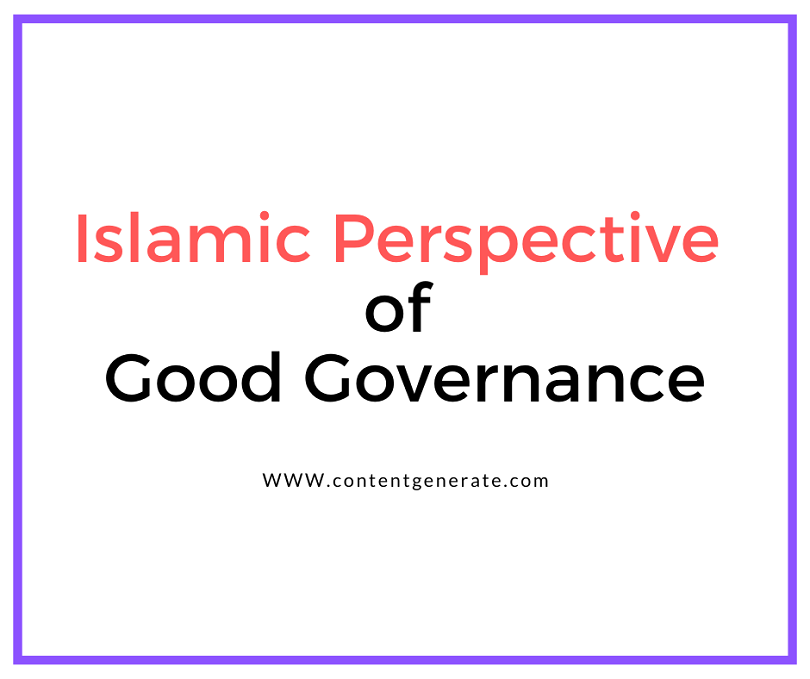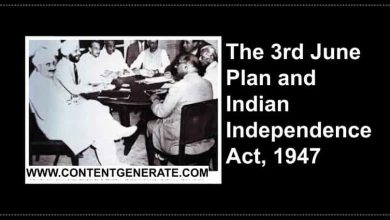Islamic Perspective of Good Governance

Good governance refers to an approach adopted by a government to create a system based on social justice and peace. It is characterized by the welfare of people and guarantees for the protection of human rights and civil liberties. In this article, I will discuss the Islamic perspective of good governance with reference to the system established at the time of the Prophet (PBUH) and Umer (RA).
The Islamic perspective of Good Governance
Islamic perspective of good governance refers to the observance of consultation, brotherhood, social justice, minority rights, equality, simplicity, and commitment to the welfare of people. In other words, it is means the rule of justice, observance of rights, responsibilities, and ethics as explained and enunciated by Islam.
Islamic state established by the Prophet (PBUH) and Umar (RA)
The government and society formed by the prophet (PBUH) and the first four caliphs of Islam are considered to have these characteristics of good governance as defined by Islam. These characteristics are discussed as below:
Consultation
The decision of the majority of people is always considered better than individual decisions. Therefore, Islam emphasizes consultation and consensus building in matters related to society. At the time of Prophet Muhammad (PBUH) and the rule of the first four caliphs, decisions were taken after consensus and deliberations.
In Ghazv e Khandaq (the Battle of Trench) when it was learned that a huge Lashkar was advancing towards Medina, the prophet Muhammad called a meeting for deliberation on whether to fight the enemy outside the city or fight them when they enter the Medina. Finally, a suggestion given by Salman al Farsi to build a big ditch to stop the entry of the enemy was unanimously agreed upon by the sahabah. Thus, consultation occupies an important place according to Islamic perspectives of good governance.
Brotherhood
According to the Islamic concept of brotherhood, a Muslim is the brother of another Muslim. He comes to help his Muslim brother in the hour of need. Brotherhood has instituted practically during the time of prophet Muhammad(PBUH) when the Ansars extended their cooperation and shared their houses, lands, fruits, etc. with them. They showed love and care for each other more than brothers, not based on blood relationship but as a result of the teaching of brotherhood as a prerequisite to act like a Muslim.
Social Justice
The Islamic society established in Medina by the prophet Mohamed (PBUH) is considered to be the best example to implement social justice. Post Muhamed (PBUH) government established by the first four caliphs were based on the principles of fair and equitable distribution of resources, provision of basic needs of people, and prevention of economic exploitation of the poor in the hands of economically strong.
Although Islam allows one to own personal property and accumulate wealth it does not allow economic disparities to grow so a large majority of people would merely live at the mercy of a few wealthy. Therefore, Islam emphasizes the fair and equitable distribution of wealth and resources. The Zakat system in Islam provides social security to the poor and the destitute by taking a share of wealth from the rich.
Protection of Minority Rights
Islam provides the right to profess religion, maintenance of the religious institution, the security of life, right to property to all non-Muslims living in an Islamic society.
In the time of the prophet and the caliphs, Jews also lived in Medina with Muslims with the freedom of practicing their religion. They enjoyed the right to trade and adopt a profession of their own. Security of their religious places was provided along with the protection of their life and property as a fundamental duty of the state. The revenue generated through taxes on non-Muslims, i.e. Jizya was spent on their own welfare.
Equality
An egalitarian state was established by the Prophet and the rightly-guided Caliphs of Islam. They preferred to be treated as one of the common Muslims. They promoted and upheld the Islamic concept of Islam according to which all are equal before Allah as human beings. No one is above law. Law will be equally applicable to all without any discrimination of color, race, and socio-economic status. Islam only differentiates people based on taqwa (Piousness).
Simplicity
Simplicity was one of the characteristics that the Prophet (PBUH) and the Caliphs encouraged in both personal and public life. The prophet (PBUH) advised Sahabah to avoid glorifying anyone except Almighty Allah. The prophet did not encourage people to stand in any ceremony for him upon arrival. He would sit with his companions as he was one of them. Similarly, Umar (RA) always refused to indulge in luxury and lived a simple life.
Commitment to Welfare
The society developed by the prophet (PBUH) and the righteous caliphs was characterized by such measures which were meant for the betterment and welfare of the people. Taxes collected through Zaka and sources as prescribed by Islam were spent for the welfare of the people without any discrimination.



